Trinity Students Innovate and Collaborate at Inaugural NESCAC Entrepreneurship Day
Five Trinity students recently traveled to the Martin Trust Center for MIT Entrepreneurship to participate in the inaugural NESCAC Entrepreneurship Day.
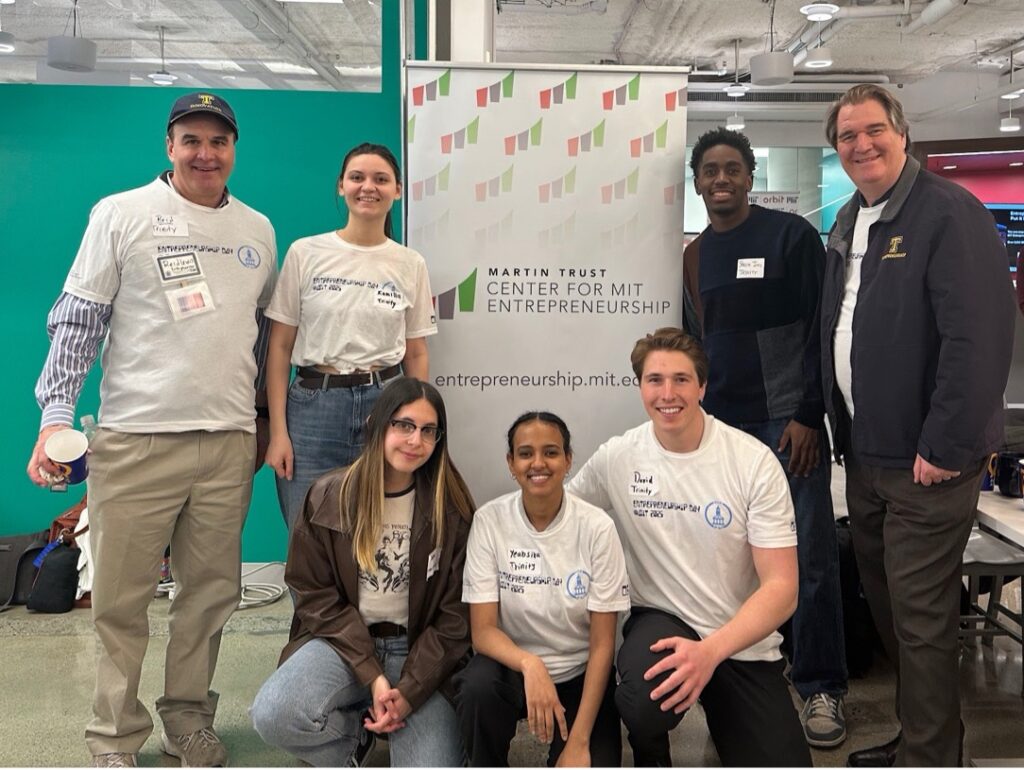
During the full-day innovation sprint on April 11, teams of five students representing a mix of NESCAC colleges and universities were assigned a problem prompt and tasked with delivering innovative and entrepreneurial solutions. Yeabsira Bizualem ’26, Shane Ivey ’27, David Paluch ’26, Hanna Saffi ’26, and Kamilla Volkova ’26 represented Trinity as student participants, while Danny Briere, executive director of the Trinity Center for Entrepreneurship, served as chair of the event.
Trinity was further represented by Reid Lewis, entrepreneur in residence at the Trinity Center for Entrepreneurship, and Steve Woodworth ’93, who served as mentors and helped guide student teams. Emily Mooney ’16 helped organize the event in her role as associate director at the Martin Trust Center, while Trinity Trustee Lou Shipley ’85, founding member of the Center for Entrepreneurship, served on the event’s Advisory Committee and judged student pitches at the end of the competition.
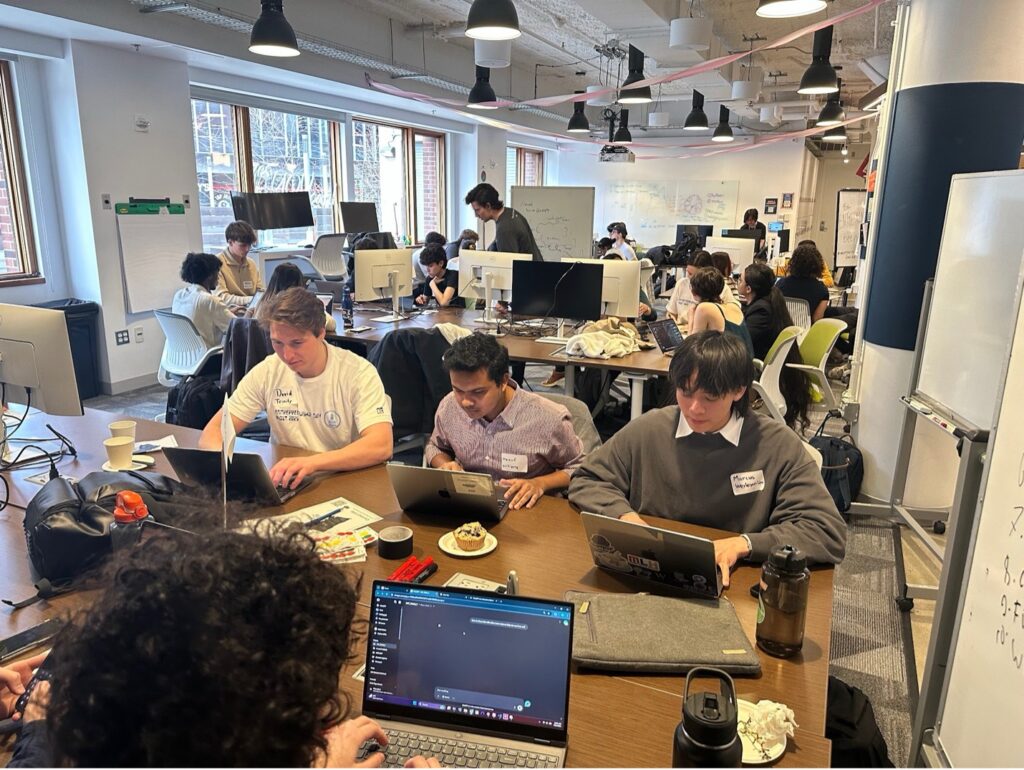
Like any innovative solution, the initial idea for NESCAC Entrepreneurship Day was sparked by ruminating on a vexing challenge. Professor Bill Aulet of MIT noticed that while there is great talent and interest at NESCAC colleges and universities for entrepreneurship, individual schools can sometimes lack the scale and critical mass of alumni to cultivate student entrepreneurs and to support ambitious projects. Because so many NESCAC alumni come through its programs, MIT offered to host the event in collaboration with the nine participating NESCAC schools. An annual event and competition in the form of a hackathon of start-up thinking was agreed upon with the goal of driving student collaboration and fostering innovation in the spirit of friendly competition.
This year’s problem prompt required student teams to develop entrepreneurial solutions for a forward-looking challenge. Students were asked to come up with a plan for a 600-acre parcel of land in central Vermont that currently operates as a ski resort. Considering future trends in climate change, demographics, and urbanization, students were tasked with turning this land into a vibrant business 20 years in the future. The prompt was deliberately left wide open; student teams had the option of maintaining the business as ski resort, turning the land into a different business to maximize profitability, pivoting toward a social enterprise, or even selling the entire parcel and using the profits to buy cryptocurrency.
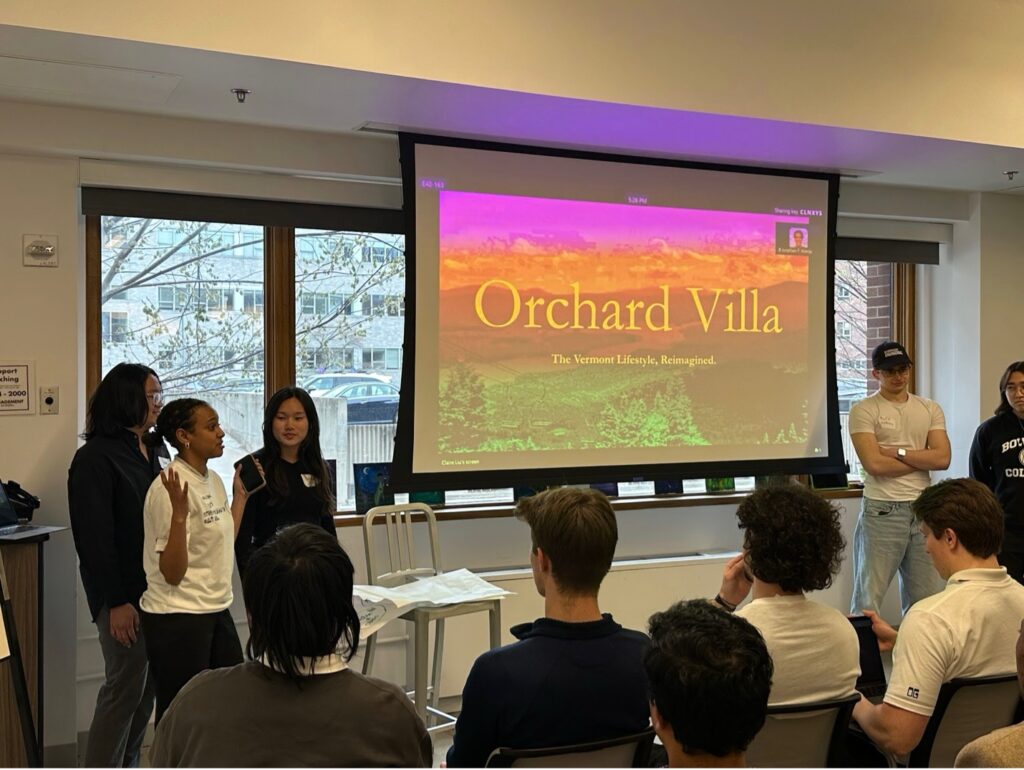
Trinity students and their corresponding teams responded with a variety of innovative solutions. “My team and I decided to take advantage of the landscape, a windy mountain with electricity that goes to the peak. We came up with ‘AI Village’—a Silicon Valley of the AI world,” said Volkova, a computer science and neuroscience major. “Every few days, there is a new AI model released, and training and maintaining them requires a huge amount of energy. AI Village would create a full-circle infrastructure for AI start-ups powered by green wind energy generated on one of the windiest peaks in the country. The judges liked our solution because it was proactive. We predicted a demand for a more connected AI infrastructure, so that when the new AI boom happens, all the AI start-ups would know where to go.”
Paluch, an economics major who also plays on the Trinity men’s ice hockey team and serves as president of the Student Entrepreneurship Club, described his team’s focus on the future of sustainable farming. “Our team created AGRO-NEXUS, a sustainable farming research center. The idea was to transform unused land into a state-of-the-art hub for agricultural innovation and data collection that could help address global food challenges,” he said. “The process was fast-paced but super collaborative; we brainstormed, divided roles, and built the concept from the ground up in just a few hours. The feedback we received was really positive, especially around the creativity of repurposing the space and the long-term global impact of the idea.”
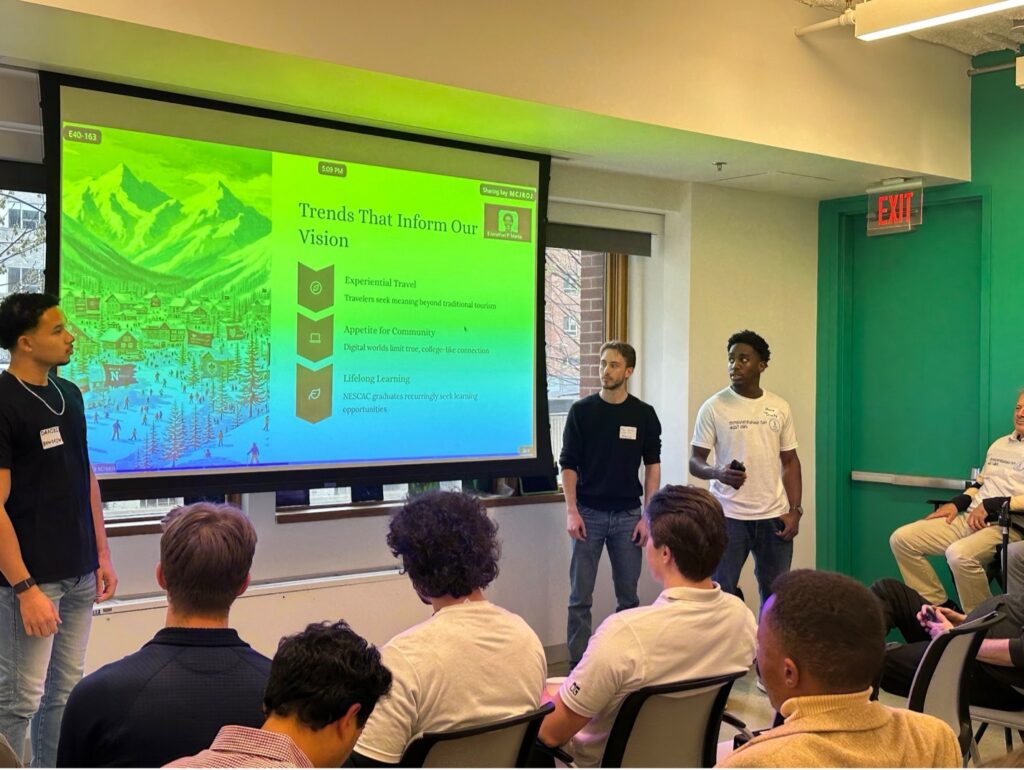
Computer science major Bizualem and her team took a different tack and elected to preserve the mountain’s use as a ski resort. “Our solution was to use the space more intentionally throughout the year. We decided to keep skiing on a smaller scale while adding a cider brewery, sourcing apples from local Vermont farmers, and creating a space for team retreats. This approach addresses climate change, involves the local community, and utilizes the space beyond just winter.”
Though the innovation sprint was packed into just one day, students gained invaluable experience to take with them throughout their continuing academic and postgraduation careers. “This was my first involvement with the Entrepreneurship Center at Trinity, so this experience was eye-opening for me,” said Volkova. “I have long harbored aspirations to start a business, however, after this event I started planning my entrepreneurship path, too. I cannot stress enough how great it was to meet like-minded people at MIT and share our aspirations in a team project.”
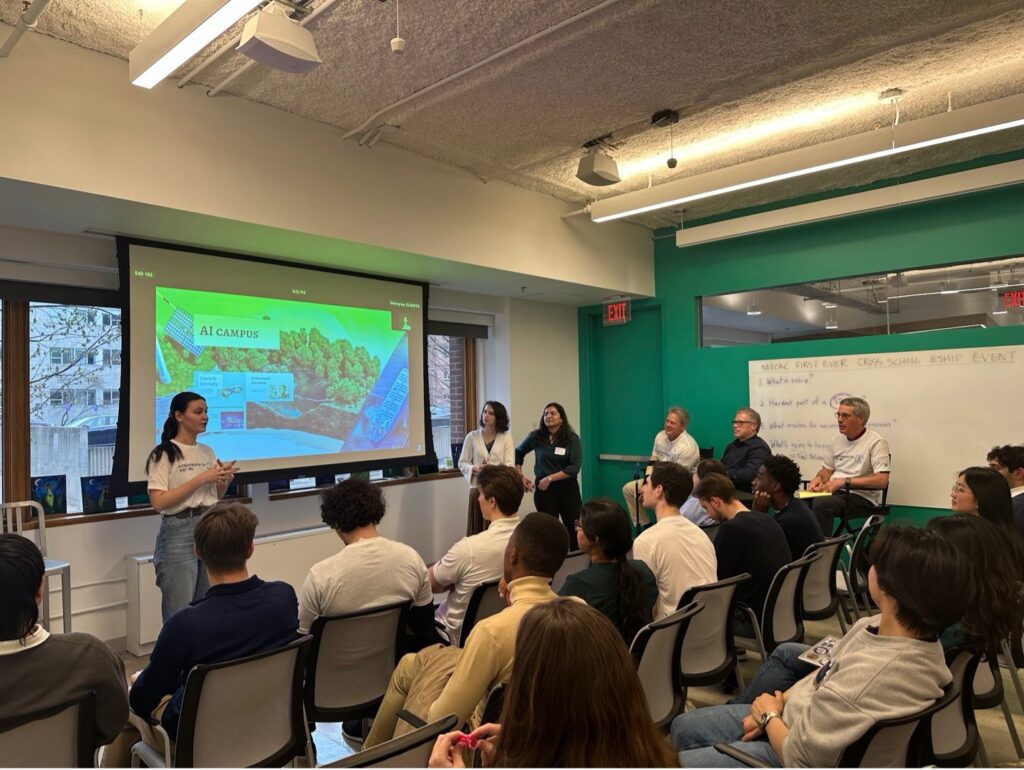
Conversely, Paluch became involved with the Entrepreneurship Center early in his time at Trinity. “I first got involved with the Entrepreneurship Center during my first year, when I had an idea to build an AI-powered health app that could diagnose injuries and illnesses simply by analyzing a photo,” he said. “I reached out to Danny Briere for guidance, and he was incredibly helpful in walking me through the early stages of developing the idea.”
Paluch identified his entrepreneurship experience as instrumental to securing an upcoming summer internship at Toronto private equity firm PE Gate. “I chose private equity because of my passion for entrepreneurship; both involve evaluating businesses, identifying opportunities for growth, and building value,” he said. “The Entrepreneurship Center has definitely helped shape that interest by exposing me to the mindset and skills that drive successful ventures.”
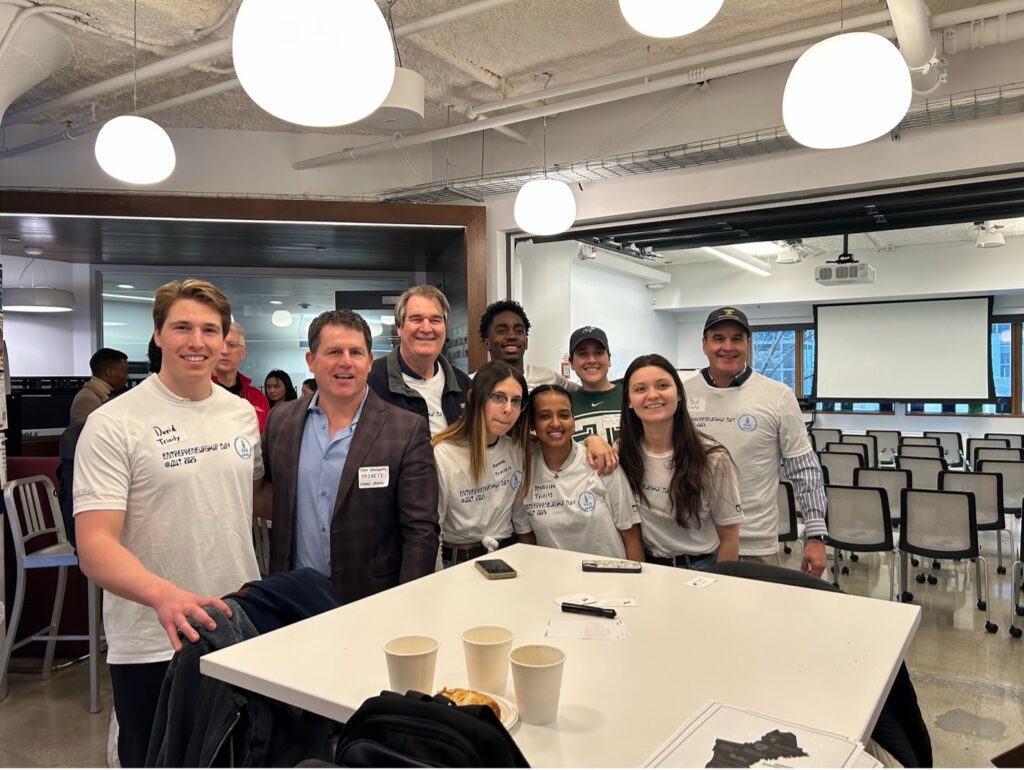
Trinity’s commitment to fostering entrepreneurship and innovation is centralized on campus at the Center for Entrepreneurship. As Briere explained, “We tend to train creativity out of students as they go through their K–12 career. At the Center for Entrepreneurship, we’re trying to put that creativity back into students, trying to get them to look at the world differently and be able to see the world from a lens of ‘This is something I can change.’ Trinity is all about that impact, about being able to create students who have the skills, the thoughtfulness, and the empathy to have an impact on the world.”
The center offers workshops, networking events, competitions, mentorship, and funding both on campus and at Trinity’s Innovation Hub in downtown Hartford. As soon as they arrive on campus, first-year students can access a range of programs that build creative problem-solving and critical thinking into their educational framework. The center’s purpose is to advance Trinity’s mission by fostering an environment where students can learn skills such as design thinking and problem-solving and get real-world experience through internships and mentoring.
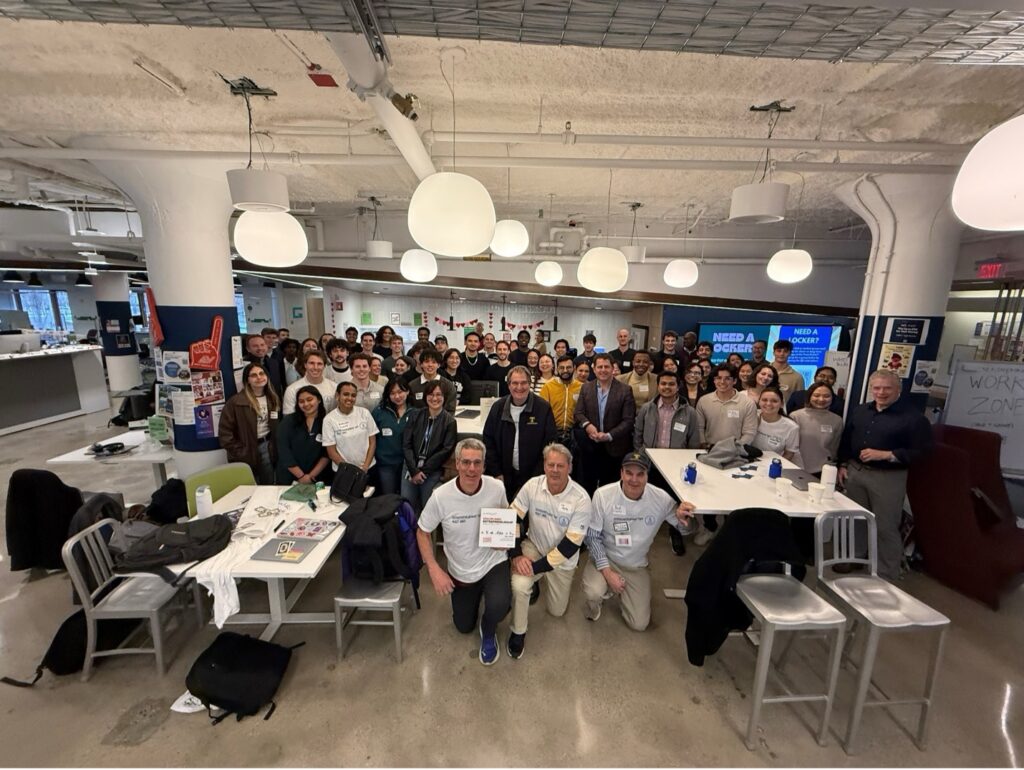
“A key part to bringing real world experience to our young student entrepreneurs is engaging them in different ecosystems so they can bolster their learning, their skills, and their networks,” said Briere. “We are executing on programs that expose students to entrepreneurial efforts not only across NESCAC but also at Stanford, MIT, Harvard, and Dartmouth. At our last networking event with the Cross-University Student Innovator (CUSI) Mixer at MIT, one of our students landed a summer internship with a fellow networker. By getting off campus, we are engaging in the larger entrepreneurial landscape.”
Briere noted that the Center for Entrepreneurship also prides itself on providing any liberal arts major, not just those interested in business or start-ups, with the confidence and know-how to turn ideas into action. “I want to have students thinking innovatively and entrepreneurially—regardless if they want to start a company—because no matter what career you go into, if you can think with an innovative and entrepreneurial mindset, you’re going to do a lot better in those careers,” he said. “Creative problem-solving, no matter what you’re going to do in life, is a lifelong skill.”
